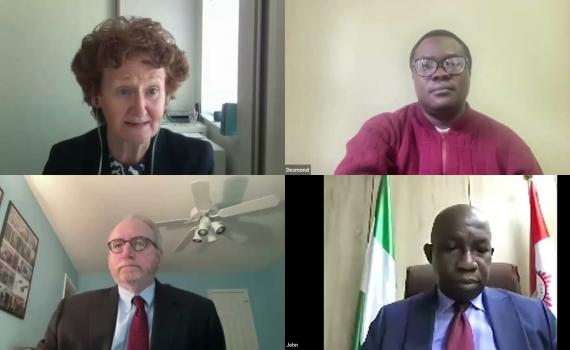
At a recent webinar organized by EIFL in cooperation with the Nigerian Copyright Commission (NCC), experts agreed that Nigeria’s Copyright Act, 2022 (adopted in 2023) is one of the best in the world with respect to libraries and library activities. It can serve as a model for other countries in Africa that are reforming their copyright laws, a reference point for implementation of the African Continental Free Trade Area (AfCFTA) Protocol on Intellectual Property (IP) Rights, and it can support work at WIPO on copyright limitations and exceptions.
Three expert speakers presented the objectives of the new law, described the key provisions for libraries, and reflected on its significance for Africa and the rest of the world. The recording and webinar materials are available online.
Balance with panache
Dr John O. Asein, Director-General, Nigerian Copyright Commission set out the key objectives of the Copyright Act, 2022 that include protecting the rights of authors to ensure just rewards and recognition for their intellectual efforts, and providing appropriate limitations and exceptions to guarantee access to creative works. Importantly, the objectives are not hierarchical, rather they represent a “community of values” to guide interpretation and implementation of the new law.
“Libraries are not only custodians of knowledge materials, they are strategic players in Nigeria’s knowledge and education architecture”.
- Dr. John O. Asein, Director-General, Nigerian Copyright Commission
Jonathan Band PLLC described the key features of the law. There are new specific exceptions for libraries, archives, museums and galleries (Section 25), in line with EIFL’s Draft Law on Copyright; new exceptions for persons with print disabilities that properly implement the Marrakesh Treaty that Nigeria joined in 2018 (Section 26), and a more flexible fair dealing provision, for example, to enable libraries to engage in activities, such as web archiving, that might not fall within the scope of the specific exceptions (Section 20(1)). In addition, the exceptions are protected from technological protection measures and licence terms that might override the exceptions (Sections 20(3) and 50(7)).
From an academic point of view, the Copyright Act, 2022 has achieved the objective of balancing the interests of different stakeholders with panache, said Dr Desmond Oriakhogba, Associate Professor, University of the Western Cape, South Africa. Thus it can serve as a model for other countries in Africa that are undergoing copyright reform, such as South Africa, Zimbabwe, Namibia and Uganda. It can also serve as a reference point for implementation of the AfCFTA’s high-level Protocol on IP Rights adopted in 2023, especially from the context of access to teaching and learning materials (the Protocol stresses the importance of using the flexibilities in the IP system to promote development and access to knowledge). Additionally, it can support work at WIPO on copyright limitations and exceptions (L&Es), such as the development of toolkits on L&Es for education and research (part of a Work Programme proposed by the African Group at the Standing Committee on Copyright and Related Rights).
EIFL commends the Nigerian Copyright Commission on the Copyright Act, 2022 that is one of the most progressive in the world with respect to libraries and library activities.
Global interest in Nigeria’s copyright law
The webinar showed strong global interest in Nigeria’s new copyright law (over 275 registrations were received from 30 countries across the globe, including 10 countries in Africa). The audience included librarians and library copyright specialists, lawyers, legal academics and researchers, policy and law makers, authors, publishers and collective management organizations.
Webinar recording and materials
SHARE / PRINT









